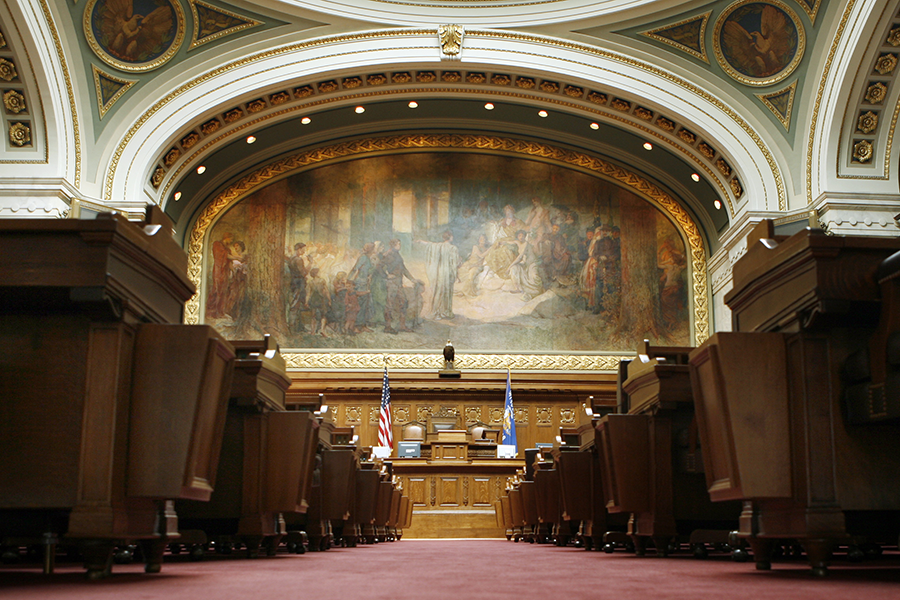FOR IMMEDIATE RELEASE: December 21, 2023
By Ken Cuccinelli & Nate Nelson | WisPolitics
‘One person one vote?’ Not with the disastrous Ranked-Choice Voting scheme.
A pair of bills was recently introduced in the Wisconsin Legislature, Senate Bill 528 and Assembly Bill 563, which would require so-called ‘Final Five’ voting in primaries whereby candidates run in a single, California-style primary regardless of their party. The top five would then advance to the general election decided by the confusing, complex, and costly Ranked-Choice Voting (RCV) system.
Make no mistake, these bills would be devastating to the integrity of Wisconsin’s elections.
The ‘Final Five’ primary combined with RCV in the general election (also known as ‘Instant-Runoff’ voting and ‘preferential’ voting) are schemes that have made voting more difficult, reduced transparency, and put confidence and certainty at risk when implemented in public elections, with horror stories in Alaska, California, Colorado, Maine, New York, Utah, Virginia and elsewhere. The result is an epidemic of disenfranchised voters whose ballots no longer are counted fairly and equally.
Importantly, Ranked Choice Voting is intended to dramatically push our politics to the Left, to elevate Left-leaning politicians, and to weaken political parties in order to empower the Left-wing megadonors who are financing a nationwide campaign to promote this dangerous system.
Democrat megadonor and former Obama Administration official Katherine Gehl is among a group of deep-pocketed individuals currently funneling Left-wing money into Wisconsin, including contributions accepted by conservative groups as well as the campaigns of numerous Republicans in the Senate and Assembly. While recipients may not be familiar with these funding sources, the purpose of such allocations is to ensure Republicans do not publicly oppose S.B. 528 and A.B. 563 in lieu of earning their affirmative support.
That’s right, Left-wing RCV proponents are trying to cozy up to select Republicans in an effort to pass their scheme into law.
RCV requires a voter to rank each candidate by assigning a numerical designation to the candidate the voter favors most to the candidate the voter favors least. If no candidate receives more than 50 percent of first-choice votes in the first round of voting, the last-place finisher is eliminated, and each ballot cast for that candidate is reallocated to the voter’s second-choice. This process continues until one candidate receives a majority of votes.
What happens when a voter does not rank every candidate, and his choices are eliminated? The ballot is deemed ‘exhausted’ and is thrown out.
For example, Alaska Democrat Mary Peltola won the state’s congressional seat last year even though nearly 60 percent of voters cast their ballots for a Republican. According to the Foundation for Government Accountability, this race saw nearly 15,000 votes discarded due to ‘ballot exhaustion,’ of which more than 11,000 were from voters who voted for only one Republican candidate and no one else.
In a 2018 Maine congressional race, then-incumbent GOP Rep. Bruce Poliquin lost to Democrat Jared Golden despite Poliquin winning the most votes in the first round of voting. According to the FGA analysis, more than 8,000 ballots were deemed “exhausted” and thrown out.
Often, so many ballots are thrown out due to ‘ballot exhaustion’ that candidates only win a majority of the remaining votes, but not a majority of all votes cast. And here, the most radical elements of the Democrat party stand to benefit most.
“While both major political parties have a history of promoting RCV, it’s primarily Democrats who are pushing states and localities to adopt the practice for future elections,” The Federalist reported. While 74 pro-RCV bills were introduced in state legislatures this past year, as noted by FGA, 57 were sponsored exclusively by Democrats with just eight percent of the total bills receiving bipartisan support. Conversely, 16 of the 17 bills opposing RCV were introduced by Republicans.
In Wisconsin, proponents of S.B 528 and A.B. 563 deceptively argue that “[v]oters also have the option to pick just one candidate in the primary or rank as many as they want, up to five choices,” as WisPolitics reports. But S.B. 528 explicitly defines ‘exhausted’ ballots and explains that they are not counted—but thrown out—in the general election.
It is unsurprising that RCV’s proponents would wish to suppress opposition given RCV’s poor track record.
A report published by University of Minnesota’s Hubert H. Humphrey School of Public Affairs this year found that RCV “fails to support four of the advocates’ promises for improvements over today’s system.” Additionally, evidence shows “no difference in turnout in cities using RCV compared to those using the current system. They report errors, confusion, and lower turnout due to the greater complexity of RCV and its process of ranking candidates and tabulating multiple rounds of voting.”
RCV is being advanced by the Leftists at the national level, yet the practice is opposed by more local Left-leaning organizations such as the NAACP which recognizes the threat to voters.
“Ranked choice voting is not beneficial to minorities. It’s voter suppression,” said Hazel Dukes, president of the NAACP New York State chapter.
The Democrat stronghold of Arlington, Virginia recently hit the brakes on RCV after being the first municipality in Virginia to use it during the June primary. “…[T]he County Board opted not to implement ranked-choice voting in its general elections in November, pointing to confusion about the process,” it was reported.
The Democrat Party in Washington, D.C. even rejects RCV, asserting that it would disenfranchise voters and end partisan primaries “that could undermine the rights of registered Democrats to choose their nominees for public office.”
In fact, D.C. Democrats sued to keep RCV off the ballot, arguing that the measure violates the U.S. Constitution, discriminates against minority voters, and “has caused and will cause ongoing harm to Plaintiffs and other residents…”
Now more than ever we need to safeguard the integrity of our elections and protect the right to vote in free and fair elections voters can trust. But the disastrous RCV scheme does precisely the opposite.
RCV is an Election Integrity wrecking ball, is never workable and should be prohibited. It should not be allowed to gain footing in Wisconsin.
Honorable Ken Cuccinelli, II is the former Virginia attorney general and acting deputy sectary of the Department of Homeland Security and is now leading the Election Transparency Initiative; Nate Nelson is the Wisconsin executive director for American Majority Action.
Provided here is a comprehensive list of RCV horror stories. Visit StopRCV.com to learn more, or view our fact sheet.

